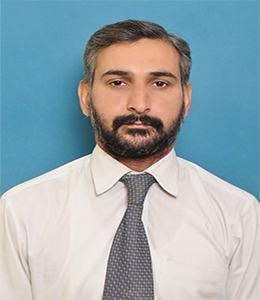Overview
ICT provide services to University to advance its competitiveness, influence and reputation. ICT empower teachers, researchers and the administration of the University, through the effective improvement and deployment of information technology. Department of ICT is committed to innovate and improve the quality of the University’s academics and administration for students, faculty and staff. Department of ICT collaborate with other HEI’s and business enterprises on mutually beneficial opportunities that support university’s goals.ICT is committed to anticipate and respond to university’s academic/administration needs. Department of ICT provides opportunities for professional growth, job satisfaction and leadership.
It is worth mentioning here that the services provided by the department of ICT are:
NUML Official website for uploading all the related documents, news and events. NUML Employee Working System (NEWS), the file tracking system of NUML employee, provides appraisal Reports, an interface to put Demand and get the salary slips on emails. Provides Infrastructure and operating environment to NUML Payroll System. NUML CMS for the online admission of students having different modules covering all the related operations during the complete tenure of student.
NUML students/faculty and management will have centralized CMS along its sub modules into main system. Different sub modules of CMS include (online admission system, class timetable, student’s record, Curriculum Management, Campus Self Service, Enrollment etc). NUML online admission system is provided for all the students through which they are capable to see the updates regarding their admission. The first ever NUML employees working system was developed by ICT software team in 2017 with Single Sign-on concept through which the all official correspondence has been taking place electronically. First ever Online Employee Appraisal System in any Public/Private Sector University has been developed by the ICT Software team, and launched 2017. Employees Appraisal System is fully integrated with NEWS NUML Employees Working System). This online evaluation has been performed on basis of un-biased criteria. In the recent past, initiatives for the improvement of quality in research has been taken by the higher education sector for promoting research & development culture within academia, however more initiatives are to be taken for quality assurance by defining assessment & evaluation criteria for educational programs so that better outcome of research could be achieved and same research may be utilized. For this purpose ICT Software Team NUML, has developed following modules: (Peer Review, Faculty Survey Report, Course Review Report, and Teachers Evolution by Student).NUML learning management system (LMS) is constituted under directorate of information communication technology (ICT) to extend the accessibility of different languages online.
NUML has created its social media for enhancing the cultural, professional and sports activities in institution, it also provide official platform for NUML students societies to present positive image of NUML nationwide. Video conference facilities are available at NUML for academic and non academic events with in all regional campuses. Digital Library access is available for all Students of NUML and Faculty for free, they can access digital library from their homes as well. The digital library link is present over the NUML website. ICT also provide social media platform like Facebook, Twitter and Instagram for information and make people updated about the NUML.
Bio-metric System Bio-Metric Attendance system for all staff, faculty and students has been deployed at NUML, Islamabad. All staff, Faculty and students have registered their finger prints in Bio-Metric server. Total 1204 Staff & Faculty members have registered into Biometric System. E-Room is established in main campus for live lecture delivery. With E-Room, NUML around the world can optimize collaborative business processes, improve innovation, and streamline decision-making.
ICT manages the issues regarding QEC portal, all departmental coordinators are responsible to update Teachers Names and make their names available on QEC online portal, if they have any issue regarding QEC online application they will report immediately to ICT.
Issues regarding Electronic board will be managed by ICT, text sent by the department should not more than 180 words with spaces, including: name of event, date of event, place of event, event organized by. Content should be mailed two days before the date of event.
ICT Provides network services to every department of NUML include wi-fi coverage, Biometric Attendance system of employees and students, VPN, Video Conferencing and Antivirus protection etc. while repair and maintenance services includes CCTV cameras, Printers, Zero Clients, IT equipment Procurement, Management and their support.
Vision
We provide services to University to advance its competitiveness, influence and reputation. We empower teachers, researchers and the administration of the University, through the effective improvement and deployment of information technology. We are committed to innovate and improve the quality of the University’s academics and administration for students, faculty and staff. We collaborate with other HEIs, institutions and business enterprises on mutually beneficial opportunities that support our goals.
Mission
We commit to anticipate and respond to our academics/administration needs. We partner with them to find and determine the appropriate solutions. In return, we expect our University to develop the skills necessary to use and support information technology and commit their resources and expertise along with ours. We respect our staff and value their contributions. We provide opportunities for professional growth, job satisfaction and leadership.
Objectives
Information technology is a vital component in the support of teaching, learning, research, and administration in higher education. NUML Pakistan students, faculty, and staff have driven the adoption of technology that supports all of these areas on our campuses just as they have in their personal lives.
The University’s expanded use of technology and the growth of its global footprint increases the demand for advanced technology capabilities and services. As the University’s information technology department is committed to listen and lead in the delivery of technology services and information resources in this dynamic environment.
The University continues to be challenged to contain costs, achieve operating efficiencies, and leverage available University resources. NUML continues to explore and deploy new scalable service delivery models, utilize University governance structures that support and facilitate thoughtful investment decisions for new and existing enterprise systems, review and prioritize enterprise system enhancements with the counsel of their advisory groups.
NUML ICT is based on four technological pillars i.e.
- Technology Infrastructure Development
- Common Applications & Online Services
- Infrastructure Strengthening
- Building of Teaching/Administration Resources
These pillars are further elaborated the complete vision and objective of ICT strategy at NUML however it continues to focus on a number of critical objectives:
- Remaining knowledgeable about new and innovative technologies that can be deployed to facilitate change and continuous improvement in the learning, teaching, research, and administration of NUML.
- Providing technology that addresses the University’s expanding global footprint and encourages NUML community relationships across time and distance.
- Promoting technology best practices and the adoption of new technologies that address the expanding technology demands of the University community and the incoming workforce, by continuing a robust and inclusive strategic planning process and fostering a continuous learning environment.
- Expanding and enhancing information security practice through education and the use of automated assessment activities, testing, and forensic services.
- Assessing whether services should be provided internally or externally to best meet University needs based on value, quality, and security.
- Promoting policies in the use of technology by the University community.
- Continuing to focus on energy-efficient Sustainable technology service choices.
- Developing funding models for information technology that address the need for timely decisions on technology
Functions and Duties
NUML ICT department is performing different technical and supporting informational and communicational functions and duties. The detail of functions/duties are mentioned below:
- ICT provides internet access to NUML through WIFI and LAN. Each employee will be assigned an email address to correspond inside or outside NUML by the approval of concern department Directors/Deans/Heads.
- NUML's Official email address is allocated to NUML Employees and NEWS account for official correspondence in NUML and get their salary slips on every month on their email.
- NUML Employee Working System (NEWS), the file tracking system of NUML employee, provides appraisal Reports, an interface to put Demand.
- ICT also manages info accounts; Director P&C is responsible to dispose of mails at info@numl.edu.pk. Each regional campus to share summary report on “info” e-mail accounts with DG NUML on monthly basis.
- ICT provides services for IT and audio-visual equipment, the concerned department collaborate to IT support team through telephone call/NUML Off email address or NEWS account regarding the issue.
- ICT provides facility to update software applications and the concerned department are bound to submit complete requirements along with request to change form sent to Director IT.
- In order to upload information on NUML Website a request to be generated by the respective main campus department or direct from coordinator or faculty member with permission of HOD/DEAN/Director of the concerned department.
- ICT is responsible to enable E-Roll Portal at the start of every semester.
- ICT manages the issues regarding QEC portal, all departmental coordinators are responsible to update Teachers Names and make their names available on QEC online portal, if they have any issue regarding QEC online application they will report immediately to ICT.
- Issues regarding Electronic board will be managed by ICT, text sent by the department should not more than 180 words with spaces, including: name of event, date of event, place of event, event organized by. Content should be mailed two days before the date of event.
- All Management regarding convocation is managed by ICT department.
- ICT manages procurement of IT equipment and electronics, demands for IT equipment or electronics will be sent to Director IT through various departments/branches including Regional campuses through NEWS or hard copy after approval from the competent authority. The procurement process in ICT is purely according to PPRA rules.
- ICT maintains reasonable stock of various type of toner cartridges to be available in short notice to the departments/branches of main campus.
- IT equipment issued to NUML employees by ICT. Owner of the equipment is responsible for its safety and cleanliness. Installation request for any special purpose software should be sent to ICT after approval of concerned department’s head.
- ICT manages the facility of video conference, requests to use the video conference facilities should be sent through Admin Branch (Jinnah Block) at least 2 days in advance. Requesting departments must mention about Online Session or Offline Session.
- ICT manages the security of password and data, in case of virus infection ICT Department must be informed, ICT will stop access to objectionable internet sites.
- ICT provides Biometric attendance system for the employees and students of NUML, for staff attendance the department of ICT will register and capture the finger prints or facial expression for any new employee or if someone is having problem with their finger print or facial expression. New employees need to visit ICT along their appointment letter for the registration. For student’s attendance Coordinators will enter the data of all the new and continuing semester students along with teachers and subjects, but if any student will not provide data on time then he/she can get registered their self by ICT.
- ICT is responsible for networking of overall campus of NUML. Devices are installed at different locations must not be changed or disturbed without informing ICT.
- ICT department manages NUML accounts on social media, the media is utilized to present all approved official activities (old as well as future events) of NUML.
Contact Us
Location
Administration Branch, Room No. #13, 1ST Floor, Salam Block
Timings
Morning:- 08:00:00-14:00:00 hrs
Evening:- 15:30:00-18:30:00 hrs
Contacts
Phone:- 92-51-9265100
Email:- dir-it@numl.edu.pk












